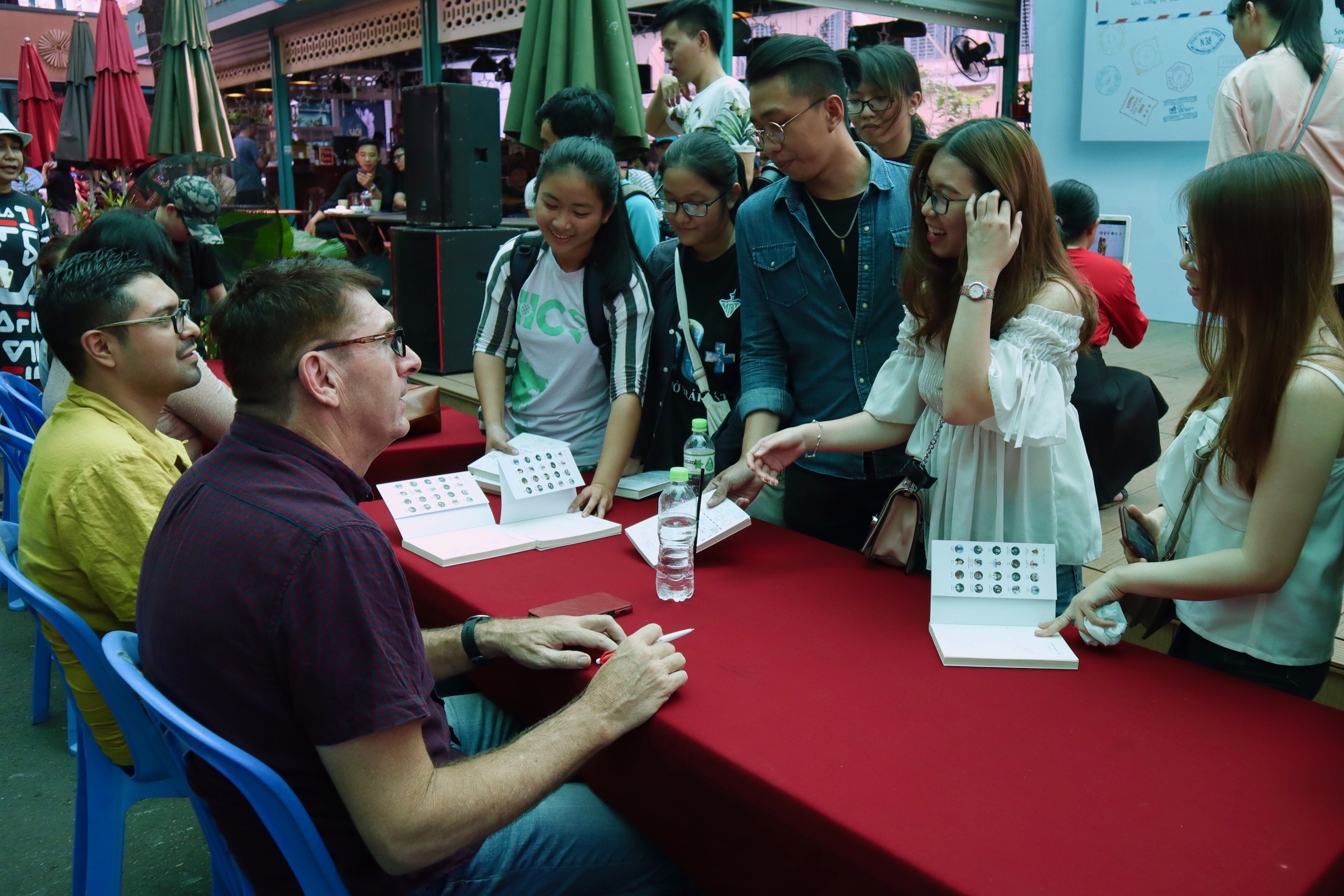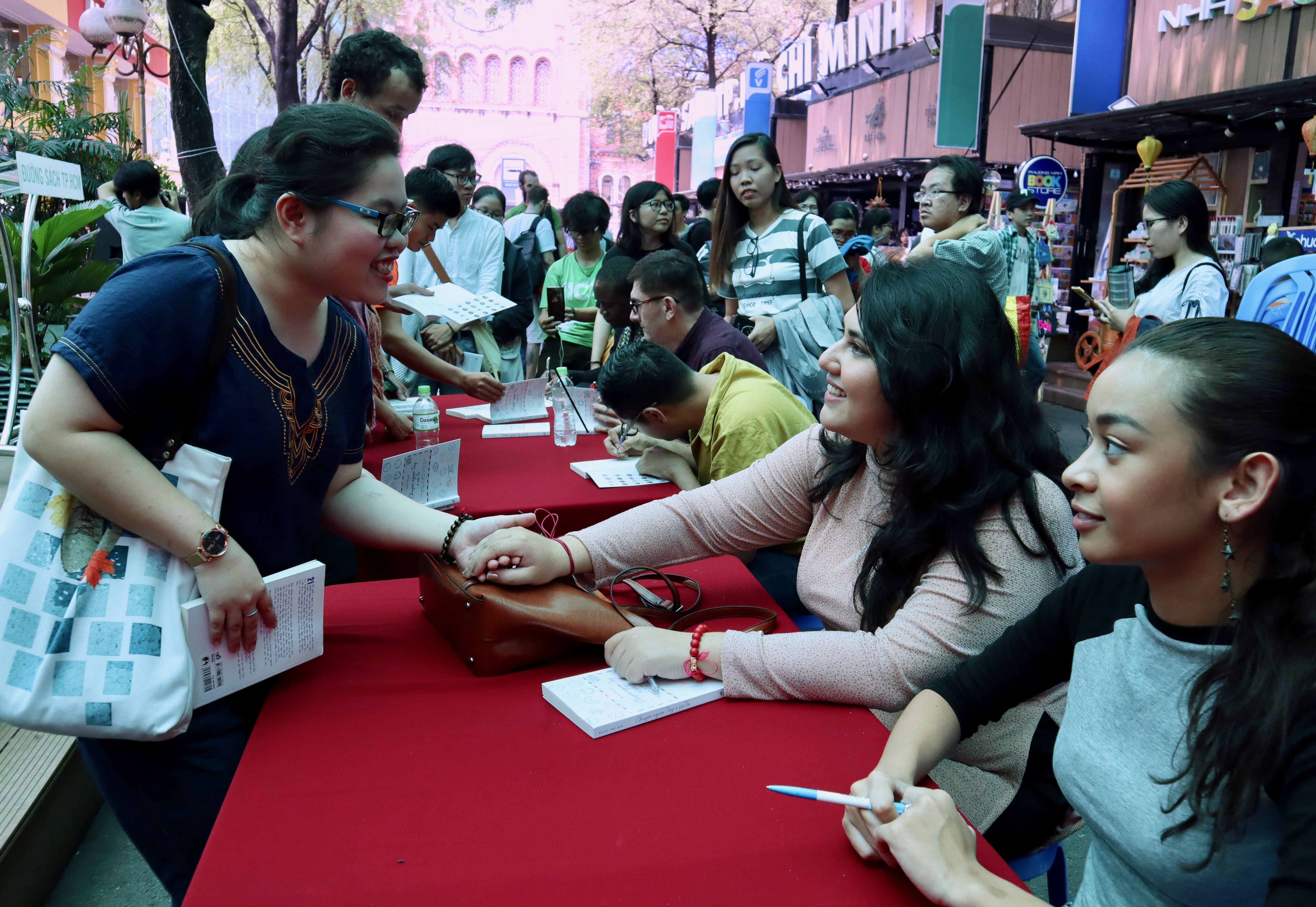Twenty-one foreigners who have spent significant time in Vietnam have shared their experiences, thoughts, and impressions on the Southeast Asian country in a 20-story anthology published earlier this month.
Chuyen nguoi Tay o xu Ta, or Stories from Westerners in Vietnam, is anthology of stories written by 21 foreigners who have lived or are living in Vietnam published in Vietnamese by Nha Nam Publishing House and The Gioi (World) Publishing House.
While some of the authors have made Vietnam their permanent home, others spend only a few months a year in the country.
But regardless of how long they spend in Vietnam each year, their background, personal story, or perspective, they all share one thing: a love for Vietnam.
21 authors
Chuyen nguoi Tay o xu Ta is the final product of an initiative by Ho Chieu Xanh (Green Passport), a non-profit organization which encourages Vietnamese to travel abroad and expand their horizons.
By giving local readers insight into different perspectives on their country, Ho Chieu Xanh hopes to help Vietnamese understand differences between Vietnamese and foreign cultures through the experiences.
The project first began with a call for contributions, and there was no shortage of submissions.
As the articles poured in, the books editors began to form a better idea of what foreigners were experiencing in different regions across the country.
Over a year later, after collecting each story, translating the English submissions to Vietnamese and editing the submissions written in Vietnamese, Ho Chieu Xanh was finally ready to release its final product.
“It took a lot of effort, both mental and physical, for this book to be published,” Sevinch Orujova Fagradinova, one of the book’s authors, said.
“I can say that this book is filled with heart and soul,” she said.
Luong Huynh Trong Nghia, the main coordinator of the project, said the organization’s goal was to create something resembling a summary of foreign perspectives of Vietnam.
“While Vietnamese find nothing strange about their own country, many things are unfamiliar and ‘wow’ the foreigners,” Nghia elaborated. “That was the inspiration of this project.”
One of the challenges the organization faced during the publication and editing process was guaranteeing the diversity among its authors the stories they told, according to Nghia.
“We had to check each author’s background, where in Vietnam they are working, what their professions are, and what they think of Vietnam,” Nghia said
“In the end, each story we received was a unique reflection of the authors’ personal views,” Nghia said, adding that he and his team “were all honored to be able to work on this project because all stories were outstanding and highly motivating.”
Timing was also a challenge as many of the authors are currently residing outside of Vietnam and time differences of several hours made it difficult to schedule meetings.
“I had to submit my article last April, almost a year ago,” said Jose Maguery Barrera, a Mexican photographer.
 |
| Readers come to the book presentation event to have their books signed. Photo: Ha My / Tuoi Tre News |
Being present at the book presentation event on March 17 in Ho Chi Minh City, Barrera added that the book took around 1.5 years to finish, and that it was not until today that he finally had a chance to meet many of the other authors.
Most of the writer’s involved only found out about the book thanks to word of mouth, said Australian Ray Kuschert, one of the authors, adding that it was his Vietnamese friend that introduced him to the project.
“I wanted to try writing in Vietnamese so I thought this would be a good opportunity,” Ondra Slowik from the Czech Republic, one of the authors, said, adding that he is also working on his own book in Vietnamese at the moment.
‘Vietnam taught me a lesson’
At the book presentation event, six of the 21 authors joined readers on Ho Chi Minh City’s Book Street to share stories from their experience of participating in the project, as well as from their time in Vietnam.
Each other was eager to share their appreciation for being given the opportunity to participate in sharing their story and all agreed that Vietnam has played a major role in their lives.
“I grew up with the word ‘Vietnam’ but I did not know what it meant,” said Kuschert, who has spent the last six years training English teachers in Vietnam, adding that it was this curiosity that first brought him to the country where his father was a soldier in Vietnam in 1965.
“I was on vacation in Vietnam with my son and after a few days in the country, I told him that it felt like home,” Kuschert said.
“Living in Vietnam has taught me a lot of lessons, and I think I would not be the same person thanks to my experience here in Vietnam,” chimed in Barrera.
According to Barrera, the most important thing he’s learned since coming to Vietnam has been an appreciation for the small things in life, which can be most clearly seen in how Vietnamese appreciate take the time to cherish each cup of coffee.
“Coffee is very important in Vietnam because it is not just about coffee,” he said, adding that his entry in the book is also about his experience with Vietnamese coffee breaks.
On the other hand, Barrera admits that Vietnamese can be very stubborn sometimes so dealing with the instances of miscommunication that comes with not speaking the language fluently can be frustrating.
Slowik, the husband and father to a Vietnamese woman and daughter, claims that in Vietnam people are more open to strangers, neighbors, and acquaintances, an attitude which fills life with many more interactions than in his home country of the Czech Republic.
“If I need to buy something quickly, I can leave my daughter with the guard of the building I’m living in. This would be impossible at home,” he said.
 |
| Sevinch, one of the authors, holds hands with a reader. Photo: Ha My / Tuoi Tre News |
Echoing his view, Sevinch Orujova Fagradinova admits that in Russia, where she grew up, people have become increasingly indifferent towards each other’s lives, while in Vietnam she still enjoys affection and concern.
For instance, if one asks for directions in Vietnam, one will receive detailed instructions from many people willing to go out of their way to help.
On the other hand, in many other countries, people would pretend they did not hear in order to avoid trouble, Sevinch said.
“One thing that is missing in Vietnam, however, is the lack of transparency and honesty,” Sevinch commented adding that many Vietnamese still avoid being direct in their demands, disapprovals, and opinions, making it hard for many to work on a professional level.
Like us on Facebook or follow us on Twitter to get the latest news about Vietnam!


















































